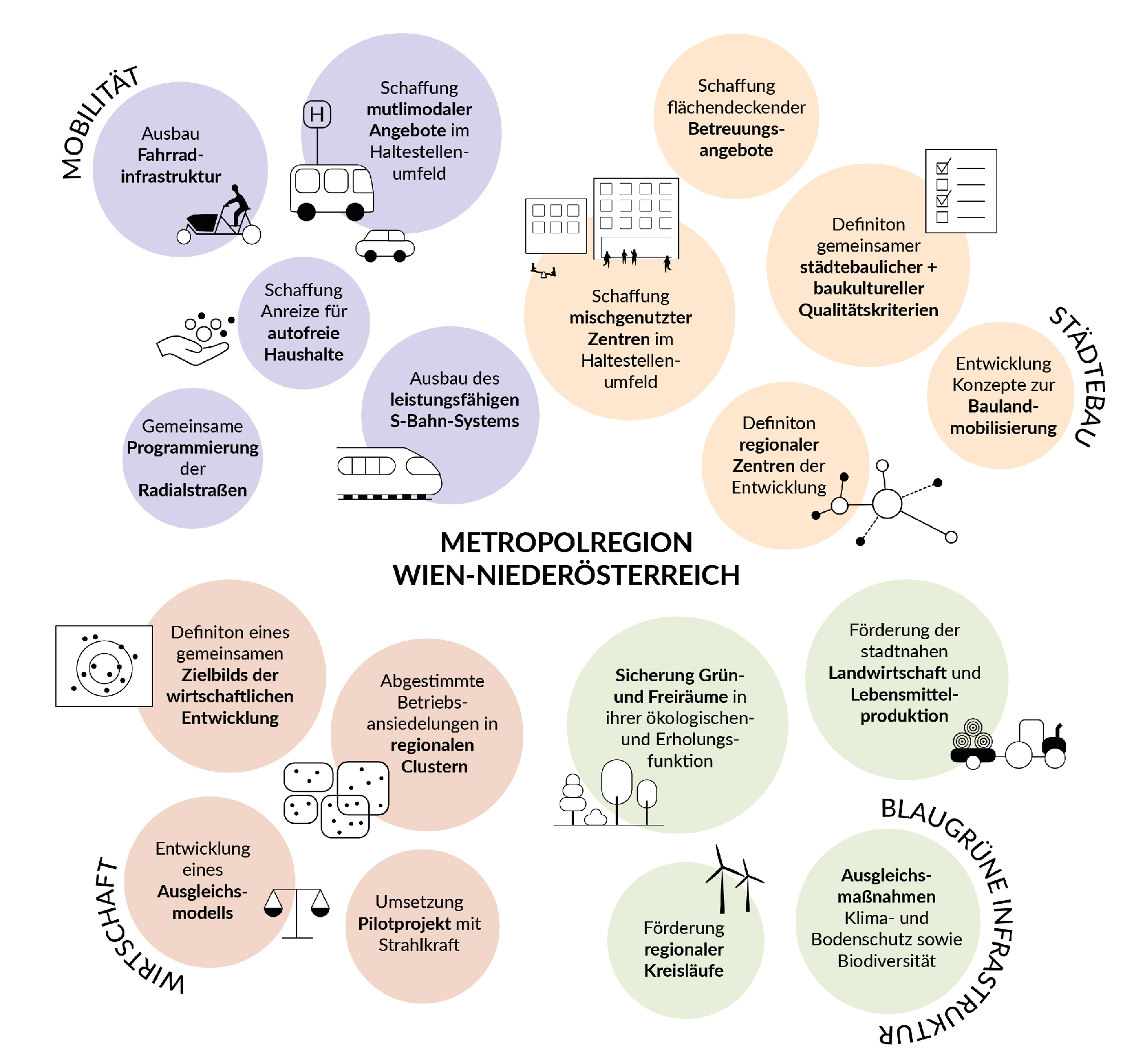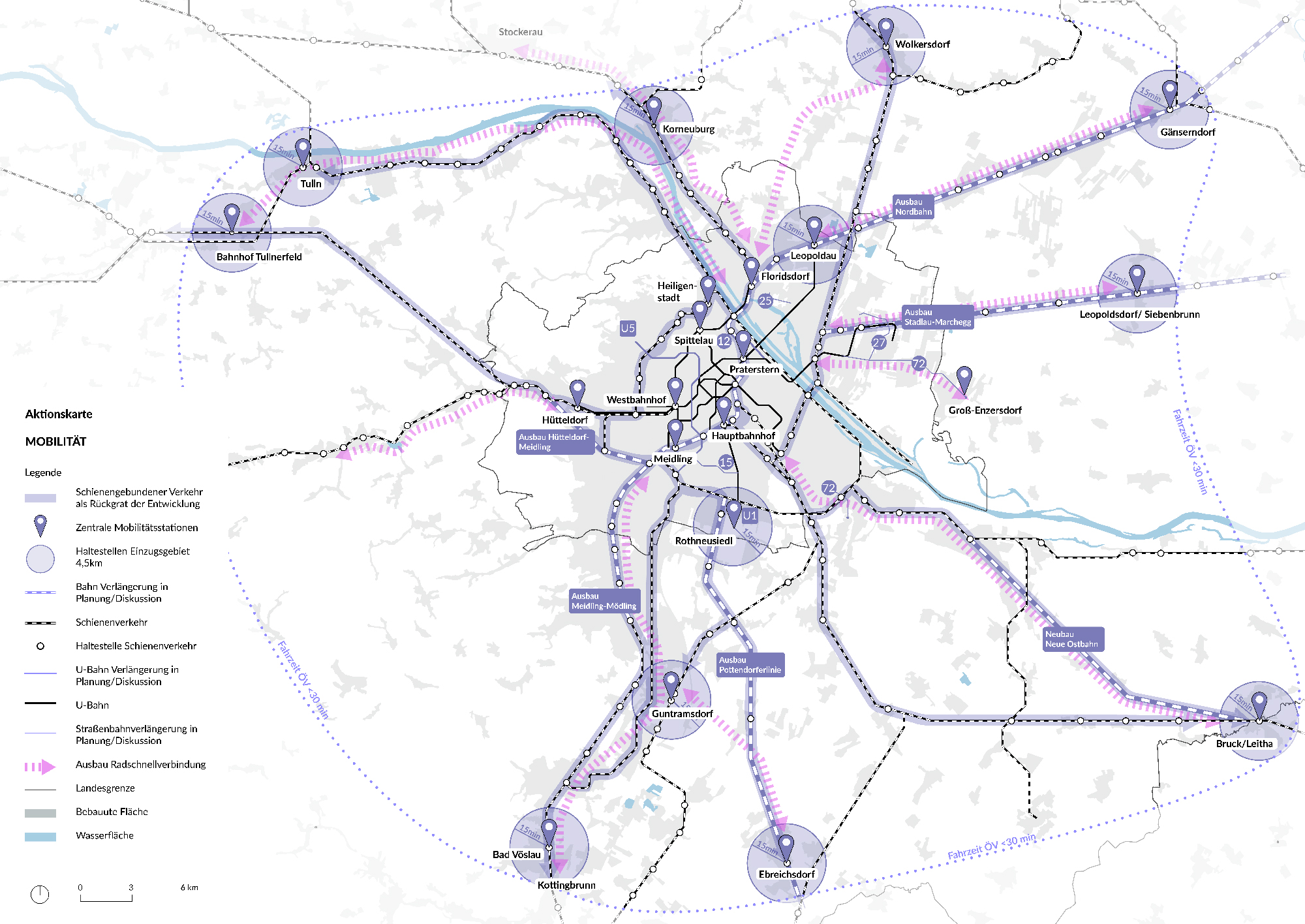STEP 2035 Metropole Wien
Vienna and Lower Austria Metropolitan Region Study
Year
2022
Status
Study Completed
Location
Vienna – Lower Austria | Austria
Client
MA18 – Stadtentwicklung und Stadtplanung Wien
Collaboration
Knollconsult Umweltplanung ZT GmbH
Im Rahmen des Entwicklungsprozesses zum neuen Stadtentwicklungsplan Wien (STEP 2035) wurde superwien urbanism und Knollconsult mit der Erarbeitung einer Studie zur Metropolregion Wien durch die Stadt Wien (MA18- Stadtentwicklung und Stadtplanung) beauftragt.
Die Metropolregion Wien-Niederösterreich sieht sich mit vielfältigen Herausforderungen konfrontiert: mit der Zunahme der Bevölkerung steigt die Nachfrage nach (leistbarem) Wohnraum sowie nach Betreuungseinrichtungen, die Klimakrise verlangt nach Maßnahmen zur Emissionsreduktion und Klimawandelanpassung, die voranschreitende Digitalisierung bedarf einer gemeinsamen Steuerung und auch die Covid-19 Pandemie verdeutlicht die Notwendigkeit einer resilienten Raumentwicklung, die regionale Kreisläufe stärkt. In diesem Zusammenhang verlieren die administrativen Grenzen zunehmend an Bedeutung, da die Kernstadt stark von den Umlandgemeinden abhängig ist und umgekehrt. Nur durch gemeinsame Anstrengungen über Sektoren und Grenzen hinweg, kann den dringlichen Herausforderungen begegnet werden. Der Ausbau und die Aufrechterhaltung eines leistungsstarken Mobilitätssystems, das nicht auf fossile Brennstoffe angewiesen ist, die Erhaltung großflächiger Naturräume, Feuchtgebiete und Grünkorridore, die Entwicklung kompakter Siedlungen mit lebendigen Zentren sowie der Ausbau erneuerbarer Energie sind Beispiele, die die Relevanz einer integrierten Planung auf stadtregionaler Ebene verdeutlichen.
Entlang bestehender Kooperationsräume und -partnerschaften wurden Zukunftshemen und Governance-Strukturen für eine integrierte Zusammenarbeit identifiziert und eine Diskussionsbasis für die Zusammenarbeit über die administrativen Grenzen hinweg geschaffen.
ENG
The metropolitan region Vienna & Lower Austria is currently confronted with a variety of challenges: with the population growth, the demand for (affordable) housing as well as for care facilities is rising, the climate crisis calls for measures to reduce emissions and adapt to climate change, the advancing digitalisation requires joint governance, and the Covid-19 pandemic highlights the need for resilient spatial development that strengthens regional cycles. In this context, administrative boundaries are increasingly losing their importance, as the core city is strongly depending on the surrounding municipalities and vice versa. Only through joint efforts beyond sectors and borders the urgent challenges can be faced. The expansion and maintenance of a high-performance mobility system that does not rely on fossil fuels, the preservation of large-scale natural areas, wetlands and green corridors, the development of compact settlements with vibrant centres, as well as the expansion of renewable energies are examples that illustrate the relevance of integrated planning on a city-regional level.
Building on existing cooperation structures and networks, future topics and governance structures were identified in order to provide a basis for discussion for cooperations across administrative boundaries.



